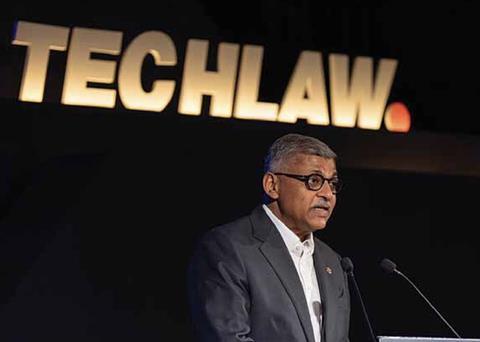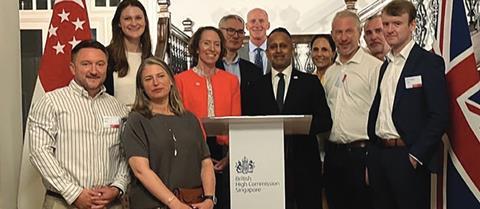International firms, AI pioneers and nine UK lawtechs assembled at TechLaw.Fest to hear about the profound changes wrought on the profession
I had the opportunity to join the GREAT Legal Services lawtech delegation to TechLaw.Fest in Singapore and to learn about the synergies between the Singapore and UK legal tech ecosystems. This was the 10th meeting of Asia’s largest law and technology conference, organised by the Singapore Academy of Law (SAL) and Singapore’s Ministry of Law. Its theme was how technology is reshaping the legal profession.
UK-Singapore lawtech roundtable

Ahead of the conference, a roundtable at the British High Commission discussed the future of lawtech. This enabled the delegation of nine UK lawtechs to meet local and international firms. They discussed where they were in their AI adoption journey, popular tools and use cases, and the level of resistance from lawyers and clients. The roundtable also explored differences between the UK and Singapore legal markets, rates of technology adoption and clients’ attitudes to their law firms using AI.
GenAI use cases were broadly similar, as was the balance between buy and build, procuring general and legal-specific tools, products and developing these in-house. Major international firms generally saw higher usage in Asia than in other regions. The same product categories and leading vendors were popular in both the UK and Singapore, including global giants such as Microsoft Copilot, Thomson Reuters, LexisNexis; AI pioneers like Luminance, which was part of the lawtech delegation, and new agentic AI platforms Harvey and Legora.
Security is an important consideration for all professional services. A key strategy for adoption is to start at the bottom of the value stack and build up user-confidence, supported by AI champions in different practice groups. As one delegate observed, it is important to ensure that lawyers understand exactly what AI tools are doing – both for the sake of transparency and to win people’s trust.
Local and international firms agreed about the importance of keeping clients in the AI loop. The optimal approach is to ensure sufficient transparency to give clients confidence in AI, while retaining overall control over processes and data. Change management and clear communication are critical success factors, especially in Singapore, where business relationships are paramount.
For Rajesh Sreenivasan, who heads Rajah & Tann’s media and telecoms practice and is director and co-founder of the firm’s technologies and cybersecurity businesses, the key to GenAI (or any technology) adoption is to make it relevant to the work lawyers are doing right now. To some extent this explains the rapid global take-up of Harvey and Legora, which bring together AI and legal expertise. They employ so many lawyers that they understand the pain points, he observed. Beyond implementation, Rajah & Tann supports GenAI adoption – and client acceptance – with strong internal and external comms campaigns. This includes producing videos showing partners talking about the firm’s GenAI use cases. These include diligence on transactions involving large property portfolios, company registration services and trade mark and patent registration.
Notwithstanding the effort going into GenAI adoption, Sreenivasan emphasises the importance of professional standards. ‘We still have to maintain the core principles of honesty, integrity, competence and diligence. And of course, we have to be accountable for our output. But what drives the proper application of AI or any tech in a law firm is these core values, plus client confidentiality.’ Another important consideration when it comes to legal tech is that Singapore has an integrated legal profession, rather than separating into barristers and solicitors, so there are more opportunities to streamline workflows.
Singapore’s SME market opportunity
Although Singapore’s domestic legal sector is relatively small, because it is the gateway to Asia, it is an important market for international law firms and tech suppliers. And there is a significant market opportunity for lawtechs targeting mid-size and smaller firms as most local firms are relatively small. Furthermore, since 2019, Singapore law firms have been able to apply for government grants towards implementing baseline and advanced solutions – and last year this was extended to GenAI solutions like Microsoft Copilot.
Finding the right clients is key for lawtech start-ups and scale-ups. And for smaller firms, AI can be a great leveller. UK lawtech delegate Paul Ryan of Focis, which provides portal and app-based solutions, asked the Singapore-UK lawtech roundtable how suppliers can connect with SME firms in Singapore. He highlighted the risk of bringing a new solution to larger firms with innovation hubs and in-house developers, who might build one for themselves rather than buying it. By contrast, mid-size and smaller firms understand the benefits that AI solutions can bring, but they are not interested in building/selling software.
GenAI-powered justice
I joined TechLaw.Fest’s tour of the Singapore Supreme Court and saw the cutting-edge technology it has introduced to expedite legal processes. The main takeaway is that the technology does not raise issues around justice as it is not applied to decision-making. Rather, it sets an example for other jurisdictions, including the UK, as it makes court and other legal processes clear, accessible and efficient for the citizens who need to use them. For example, in Singapore, a straightforward probate application takes only 7.5 days. Some of these digital justice initiatives – which include international companies’ products and services – were showcased at TechLaw.Fest.
Senior parliamentary secretary at the Ministry of Law Eric Chua referenced government initiatives that support legal tech and AI adoption, including a guide for using GenAI in the legal sector. There is also the Legal Innovation and Future-Readiness Transformation initiative, which provides change management support to Singapore law practices in their legaltech adoption, including AI tools. The pilot phase is for smaller law practices, with PwC as its appointed legaltech consultant. LegalTech GoWhere is designed to grow Singapore’s legaltech ecosystem and create more avenues for discovery and collaboration.

Chief Justice Sundaresh Menon’s keynote speech (pictured) focused on how the increased complexity of technology and its ease of deployment are transforming legal services and the law itself. He highlighted synergies between the approaches of Singapore and the UK to AI regulation, as well as some of the regulatory challenges presented by GenAI. He also outlined several innovative e-services that have been deployed in Singapore’s courts and tribunal services. These include: the Authentic Court Orders system, which enables users to authenticate court orders online; e-services for divorce and probate; a motor accident claims online (MACO) simulator; and an online claims service. In collaboration with Harvey, the Small Claims Tribunals have deployed GenAI tools for document translation and summation.
He concluded by identifying two critical attributes for progress. These are a commitment to multi-disciplinarity – bringing new skill sets into the legal profession and legal education – and a transnational outlook ‘to draw upon the combined wealth of experience and learning that can be derived from a comparative approach’. He also referenced participating in Lawtech UK’s International Jurisdiction Taskforce.
International alliances
TechLaw.Fest brought together over 2,000 legal tech stakeholders from more than 40 countries to foster relationships between Singapore legal institutions and international legal tech vendors. GREAT Legal Services had a strong presence in the exhibition and on the Tech Bytes stage. Minister for courts and legal services Sarah Sackman KC said: ‘We are turbocharging our economy by showcasing British legal excellence on the world stage – driving growth, attracting investment, and promoting our £42.6bn legal sector. By connecting delegates with global investors and industry leaders at south-east Asia’s leading legal tech conference, we are reinforcing the UK’s pole position as the world’s top legal services hub.’
The GREAT Legal Services stand enabled the UK lawtechs to interact with delegates from across Asia-Pacific countries. A panel moderated by Martin Kent, UK trade commissioner for Asia, explored how AI is changing the future of law. We heard from Clementine Fox, Australia general manager at Luminance; Mark Kingsley-Williams, founder of AILA, an AI legal admin assistant for in-house lawyers; Mark Reynolds, global director, professional services at legaltech consultancy Jalubro, which specialises in AI contract management, legal automation and digital transformation; and Zoe Bucknell, CEO and co-founder at Kuberno, which deploys agentic AI to power Kube, its global entity management platform.
Another UK lawtechs showcase included: Ai4U.digital, which creates purpose-built AI assistants to automate routine processes; and Credas, which streamlines onboarding and manages compliance and due diligence. Focis provides portal and app-based solutions for law firms to connect clients and workflows, while Semeris, a contract review platform, combines AI and human effort to help capital markets professionals and lawyers to read complex legal documents.
At a reception at the British High Commission, British High Commissioner to Singapore Nik Mehta said: ‘As one of the world’s most dynamic legal and financial centres, Singapore’s commitment to digital transformation and regulatory innovation makes it an ideal partner for our companies to scale their solutions here and in the wider south-east Asia region. Investing in partnerships like this is how we’re delivering growth – supporting British businesses to seize new opportunities while cementing the UK’s position as a global leader in high-value sectors.’
Legal innovation in APAC

The second day of the conference saw the launch of the State of Legal Innovation in Asia-Pacific (SOLIA) Report 2025, presented by its chief editor Brian W Tang, founding executive director of the University of Hong Kong Law, Innovation, Technology and Entrepreneurship Lab and co-chair of the Asia-Pacific Legal Innovation & Technology Association (ALITA). The report, Responsible Digital Lawyering: Impact of AI across Asia-Pacific 2025, explores the findings of a survey conducted in collaboration with LexisNexis Legal & Professional. It covers 11 jurisdictions and features resources, including a map of available solutions, and an AI and legaltech buyer’s guide designed for SME law firms and chambers.
While the findings relate to APAC, and Singapore lawyers represent 143 out of the 287 respondents, the trends they identify are universally applicable. Nearly 90% of APAC legal professional respondents use AI in their work, although there are regional variations. Asia (88%) is ahead of Hong Kong and Mainland China (70%), and Australia and New Zealand (50%). (LexisNexis research also conducted in August 2025 found that more than 61% of UK legal professionals use AI at work). Legal departments use AI more than law firms, which use more specialised legal-specific tools.
Unsurprisingly, the top benefits are productivity (saving time) and efficiency, while the main concerns are accuracy (trust in outputs and time wasted reviewing unreliable outputs) and data security/confidentiality. Like their counterparts in the UK and US, specialist legal tools are used for document review and analysis and legal drafting. General-purpose tools like Microsoft Copilot are used for personal productivity tasks such as drafting emails, summarising documents, and legal research.
Law firm and corporate legal respondents across APAC believe that responsible AI digital lawyering will change the legal industry, disrupting traditional billing and resourcing models and requiring new skillsets. This is partly driven by AI shifting clients’ expectations around value in legal services delivery. It also requires ‘rethinking legal training and law schools’ for the ‘AI era’.
These findings reflect what is happening across the legal and legal tech sectors worldwide, demonstrating the global evolution of lawtech across regions and jurisdictions. But as legal digital projects across Singapore’s Ministry of Law, Supreme Court and SAL demonstrate, there is much the UK can learn from other jurisdictions.
Legal research alliances
A report by the Asia-Pacific Legal Innovation & Technology Association (ALITA) highlighted the need for legal education to adapt to the AI era. The Singapore Academy of Law is continuing its transformation of legal research, with the launch of GenAI-enhanced legal research platform LawNet 4.0, the latest iteration of a research tool that was originally launched in 1990.
LawNet 4.0 features the new GPT-Legal Q&A model, developed in collaboration with the Infocomm Media Development Authority of Singapore (part of the Ministry of Digital Development and Information) and is fine-tuned for contract law. This allows lawyers to ask questions in natural language and receive AI-generated responses supported by Singapore case law and legislation.
Also announced at TechLaw.Fest were SAL’s strategic partnerships with LexisNexis, Thomson Reuters, vLex, and Legora, which, from 1 October, will provide global access to Singapore case law, including the Singapore Law Reports. SAL is working with Legora to integrate its database of contract precedents to enable AI-assisted contract drafting and review. ‘These partnerships are significant steps in advancing our mission to promote Singapore law globally,’ said Zee Kin Yeong, SAL’s chief executive.































No comments yet